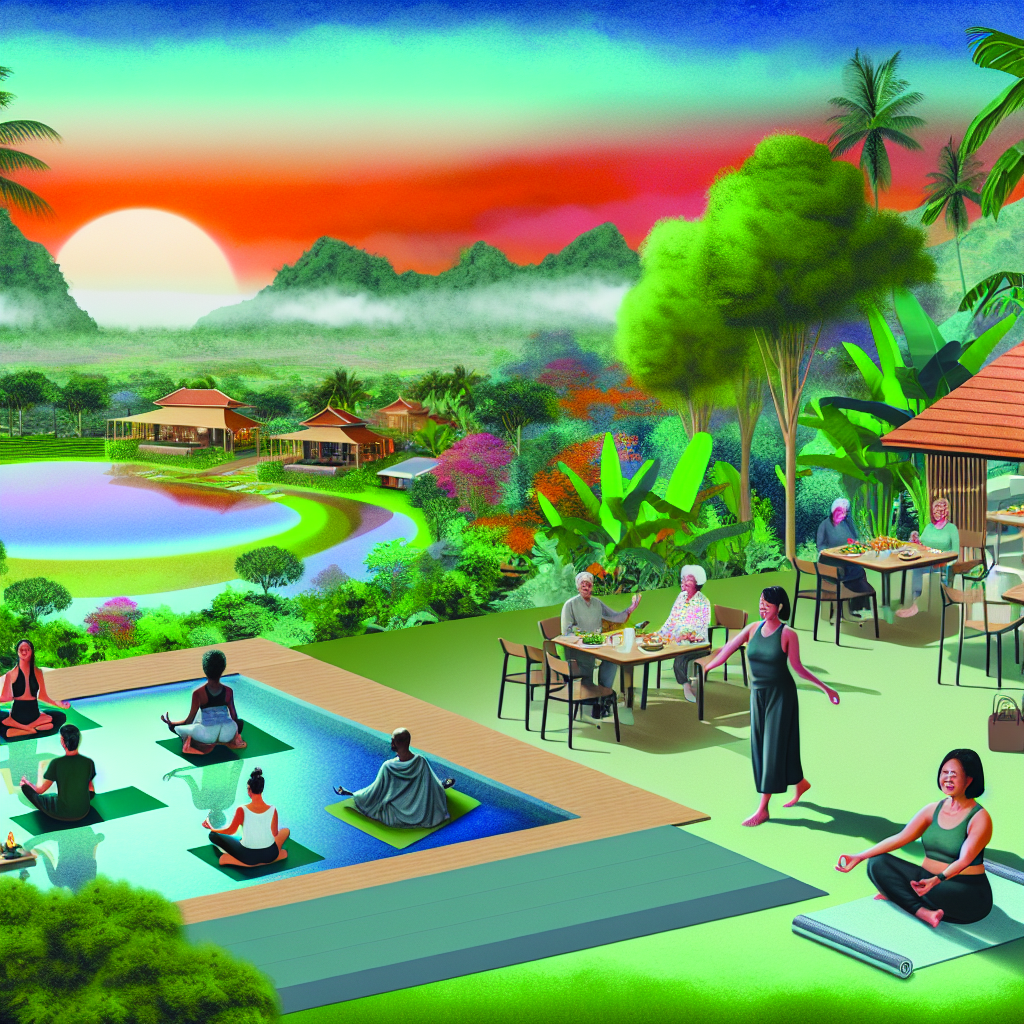Holistic Retreats for Burnout Recovery and Reset
Introduction
In today’s fast-paced, hyperconnected world, burnout has become a widespread health concern — particularly among men of all ages in the United States. Whether you’re a high-performing teenager juggling academics and athletics, a working professional balancing deadlines and family duties, or a retiree facing major life transitions, the prolonged stress and fatigue associated with burnout can affect you deeply. Often, men’s burnout symptoms — including irritability, sleep disturbances, physical fatigue, and emotional detachment — go unrecognized or untreated, largely due to societal expectations around masculinity and emotional suppression.
The added stress and isolation prompted by the global pandemic have only worsened this crisis. While medication and talk therapy remain viable treatment options, more American men are seeking holistic recovery approaches — notably, holistic retreats for men.
These men’s wellness retreats are immersive healing experiences that restore your well-being across multiple dimensions: physical, emotional, mental, and spiritual. From guided meditation and mindfulness to nature excursions and anti-inflammatory diets, these programs are not about short-term relief — they offer structured, sustainable transformation. Designed specifically to relieve chronic stress and emotional fatigue, retreats provide a nurturing space for healing far removed from everyday demands.
Whether situated in serene Colorado mountain lodges or quiet California beach resorts, holistic retreats in the U.S. offer varying lengths and formats — from weekend resets to full-month revivals. Each program integrates proven healing modalities and emphasizes mindfulness, reconnection, and personal growth.
More than just anecdotal success, the rise in these retreats reflects an evolving understanding of health rooted in scientific evidence. Techniques such as meditative movement, nature immersion, digital detox, and mindfulness-based stress reduction are all substantiated by compelling research.
With burnout becoming an urgent men’s health issue across generations, exploring comprehensive, alternative wellness strategies like these isn’t just an option — it’s a modern necessity.
Features: What the Research Says About Holistic Retreats and Burnout Recovery
Scientific research is increasingly supporting what wellness advocates and retreat participants have observed for years: stepping away from the chaos of everyday life and immersing oneself in a structured, supportive environment with holistic healing tools can significantly enhance well-being.
A pivotal study published in the Journal of Alternative and Complementary Medicine showed that participants of a one-week holistic program experienced statistically meaningful reductions in perceived stress. They also reported improved sleep, increased energy, better mood, and a greater sense of well-being ([Naidoo et al., 2018](https://doi.org/10.1089/acm.2018.0033)).
While burnout is often mistakenly viewed as purely a psychological issue, it creates physical symptoms and biological disruptions. Chronic stress elevates cortisol levels, weakens immune function, and contributes to inflammation — a known risk factor in many chronic conditions. The [Mayo Clinic](https://www.mayoclinic.org/healthy-lifestyle/adult-health/in-depth/burnout/art-20046642) highlights how prolonged burnout can affect cardiovascular health, sleep cycles, and emotional balance. Holistic retreats counteract these symptoms by using tools like inflammation-fighting diets, hormone regulation, and restorative sleep protocols.
Mindfulness has emerged as one of the most powerful practices for addressing burnout-related suffering. Research conducted and published in JAMA Internal Medicine found that mindfulness meditation programs significantly reduce psychological stress, anxiety, and depressive symptoms — key hallmarks of burnout ([Goyal et al., 2014](https://jamanetwork.com/journals/jamainternalmedicine/fullarticle/1809754)).
Another essential component of many wellness retreats is the practice of digital detox. Study findings from the [University of Pennsylvania](https://www.ajpmonline.org/article/S0749-3797(17)30016-8/fulltext) revealed that reducing social media use can enhance mental health by decreasing loneliness and symptoms of depression. Disconnecting from technological distractions during a retreat can significantly restore attention, reduce overstimulation, and improve emotional stability.
Nature-based healing is another core element. Termed “forest bathing” or ecotherapy, this practice offers powerful emotional and physiological benefits. A 2015 study in Frontiers in Psychology found that nature immersion decreases cortisol (a primary stress hormone), enhances mood, and lowers blood pressure, all of which contribute to a calm nervous system ([Hunt et al., 2015](https://www.frontiersin.org/articles/10.3389/fpsyg.2015.00765/full)).
Holistic retreats also create spaces for emotional growth through group therapy and one-on-one coaching. Especially in male-only settings, these interactions foster emotional safety, peer connection, and vulnerability — topics often stigmatized among men.
Older men, particularly retirees facing a loss of identity or increased isolation, benefit from structured routines, communal living, and renewed purpose that retreats can offer. Similarly, younger men gain invaluable skills such as emotional intelligence, habitual restoration, and mental resilience — often left out of school and workplace training.
Whether navigating midlife in your 40s, discovering new purpose post-retirement, or simply resetting after career burnout, these programs offer transformative possibilities tailored to your life stage.
Conclusion
Holistic retreats are not just retreats — they are reset points for mind, body, and soul. For men at any point in life’s journey, disengaging from life’s daily stressors and reconnecting with self through guided healing creates a ripple effect of transformation, balance, and clarity.
Burnout recovery can no longer rely on temporary measures or outdated expectations of endurance. It demands a layered, integrated approach that respects the body’s needs, honors emotional shifts, and restores spiritual grounding. This is exactly what holistic retreats provide: an evidence-based yet deeply personal method for reclaiming energy and building lifelong wellness habits.
Whether you’re considering a weekend wellness getaway or a month-long transformative experience, investing in holistic healing isn’t a luxury — it’s a sustainable, restorative solution to long-term, whole-person health.
Concise Summary
Holistic retreats are transformative experiences designed to help men recover from burnout by addressing physical, emotional, and mental stress through evidence-based methods such as mindfulness, nature immersion, digital detox, and nutritional therapy. Unlike short-term solutions, these retreats focus on comprehensive healing in structured, supportive environments. Backed by science, they offer men of all ages—from teens to retirees—a pathway to restore balance, clarity, and vitality. Especially effective for chronic stress relief and emotional well-being, holistic retreats are increasingly viewed not as indulgences, but as necessities for long-term health.
References
– [Naidoo, U., Park, C., et al. (2018). “The Effect of a Wellness Retreat on Stress and Well-being.” Journal of Alternative and Complementary Medicine.](https://doi.org/10.1089/acm.2018.0033)
– [Goyal, M., et al. (2014). “Meditation Programs for Psychological Stress and Well-being: A Systematic Review and Meta-analysis.” JAMA Internal Medicine.](https://jamanetwork.com/journals/jamainternalmedicine/fullarticle/1809754)
– [Mayo Clinic Staff. (2021). “Job burnout: How to spot it and take action.” Mayo Clinic.](https://www.mayoclinic.org/healthy-lifestyle/adult-health/in-depth/burnout/art-20046642)
– [Hunt, M., Marx, R., Lipson, C., & Young, J. (2015). “Nature Exposure Reduces Rumination and Subgenual Prefrontal Cortex Activation.” Frontiers in Psychology.](https://www.frontiersin.org/articles/10.3389/fpsyg.2015.00765/full)
– [Hunt, M., & Marx, R. (2018). “Effects of a nature-based mindfulness retreat on well-being.” Psychological Reports.](https://journals.sagepub.com/doi/abs/10.1177/0033294118793813)
– [Primack, B., Shensa, A., et al. (2018). “Social Media Use and Perceived Social Isolation Among Young Adults in the U.S.” American Journal of Preventive Medicine.](https://www.ajpmonline.org/article/S0749-3797(17)30016-8/fulltext)
For more tailored wellness tools and resources for men, visit: [www.menshealth911.com](http://www.menshealth911.com)

Dominic E. is a passionate filmmaker navigating the exciting intersection of art and science. By day, he delves into the complexities of the human body as a full-time medical writer, meticulously translating intricate medical concepts into accessible and engaging narratives. By night, he explores the boundless realm of cinematic storytelling, crafting narratives that evoke emotion and challenge perspectives. Film Student and Full-time Medical Writer for ContentVendor.com



